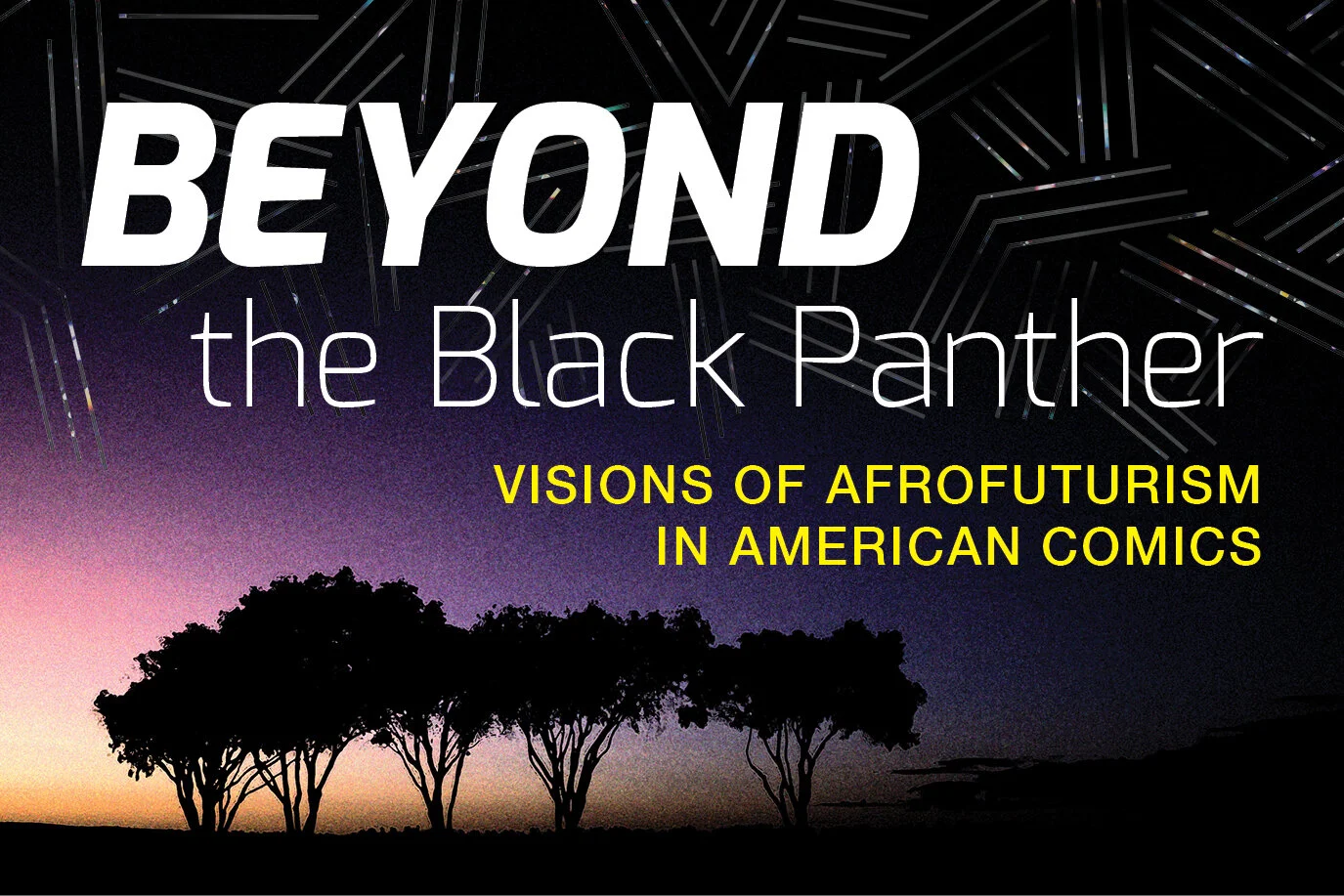Vision
A vision of Afrofuturism seeks to better understand the forms, color, textures, and shape linked to the black experience.
What can you see?
From an aesthetic perspective, contemporary Afrofuturism continues an established practice of black scholars and artists seeking to celebrate forms, shapes, and textures linked to the African Diaspora.
Comics + Afrofuturism
As part of the University of Iowa's Mellon Sawyer Seminar devoted to “Racial Reckoning Through Comics,” I explored how an Afrofuturist approach to comics represents an opportunity to rethink the meaning and function of blackness in the western context.
Many Visions
The 2022 Zora Neale Hurston Festival of the Arts and Humanities focused on exploring the vision of Afrofuturism. This year, I wanted to call attention to the many vision of the future shaping the global landscape. Afrofuturism as a practice, asks us to think differently about the future.
Transfiguration
According to Reynaldo Anderson, founder of Black Speculative Arts Movement, this aesthetic practice integrates Afrodiasporic and African metaphysics with science or technology and seeks to interpret, engage, design, or alter reality for the re-imagination of the past, the contested present, and act as a catalyst for the future. Transfiguration spotlights how visual narrative at the heart of Afrofuturist practice is part of a longer Black speculative tradition. Black speculative thought works against anti-Blackness and imagines a space devoid of colonial frameworks and systemic racism. Transfiguration takes up Reverend Dr. Martin Luther King, Jr.’s observation that Black visions of freedom strive for a better future. The artists featured in this exhibition engage with the theme central to Dr. King’s legacy, offering visions of freedom across genre and circumstance. --- Dr. Julian Chambliss
Afrofuturism: The Past, the Present, and Beyond
As a part of the 2022 Black Comic Festival at the Schomburg. I moderated the "Afrofuturism: The Past, Present, and Beyond." This examines the extraordinary history of Afrofuturism in the arts, scholarship, and activism. The discussion features Ytasha Womack, John Jennings, and Reynaldo Anderson.
The Afrofuturist Comic Roundtable
The 2021 Live Arts Altered-Worlds: Black Utopia and the Age of Acceleration featured a roundtable discussion about comics and Afrofuturism.
Beyond Black Panther
Most people are familiar with Marvel's Black Panther, and some are aware of its connections to Afrofuturism, a framework to understand how the black imagination manifests visions of freedom. This virtual exhibition will explore how themes such as aesthetics, Black feminism, and community, common to Afrofuturism, shape contemporary Black comics.
Beyond the Black Panther gives us a view of stories inspired by African folklore such as Is’nana the Were-Spider, science fiction adventures centered on a black female hero such as Matty’s Rocket, or vital social commentary about police violence such as I am Alfonso Jones. The MSU Museum exhibition curated by Dr. Julian Chambliss opens the door to a dynamic visual world.
Secret Comic Origins of Afrofuturism
When you think about Afrofuturism do you think about comics? There is a secret comic origin to Afrofuturism that broadens the scope of what you know about black visions of the future.
A Project of Recovery
What can we learn about black liberation from African American comics? In this talk inspired by Beyond the Black Panther: Visions of Afrofuturism in American Comics, I outline visions of liberation linked to Afrofuturist comics in the exhibit.
Transfiguration, an exhibition curated by Julian Chambliss at Patricia & Phillip Frost Art Museum at Florida International University, spotlights how visual narrative at the heart of Afrofuturist practice is part of a longer Black speculative tradition. Black speculative thought, with significant roots in nineteenth-century literature, works against anti-Blackness and imagines a space devoid of colonial frameworks and systemic racism. Transfiguration takes
Talking with Tim Fielder
Tim Fielder is having a moment. I've known of and admired his work for a few years. His recent book Infinitum is an Afrofuturist tale epic in scope and steeped in Afrodiasporic experience that seeks to push visual storytelling connected to Afrofuturism to a new level. Tim’s previous graphic novel Matty’s Rocket was completely different. As part of the Graphic Possibilities Research Workshop, I brought Tim to MSU to learn more about the ideas that shape his work. In this conversation, I’m joined by my colleague Kinitra Brooks and one of the graduate leads for the Graphic Possibilities Research Workshop Justin Wigard.









